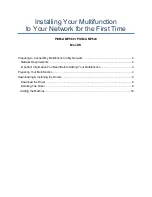
Solving color quality problems
151
Troubleshooting
Solving color quality problems
This section helps answer some basic color-related questions and describes how some of the features provided in the
Quality Menu can be used to solve typical color problems.
Note: Read Solving print quality problems which provides solutions for common print quality problems,
some of which may affect the color quality of the printed output.
Frequently asked questions (FAQ) about color printing
What is RGB color?
Red, green, and blue light can be added together in various amounts to produce a large range of colors observed in nature.
For example, red and green light can be combined to create yellow light. Televisions and computer monitors create colors in
this manner. RGB color is a method of describing colors by indicating the amount of red, green, and blue light needed to
reproduce a particular color.
What is CMYK color?
Cyan, magenta, yellow, and black inks or toners can be printed in various amounts to produce a large range of colors
observed in nature. For example, cyan and yellow can be combined to create green. Printing presses, inkjet printers, and
color laser printers create colors in this manner. CMYK color is a method of describing colors by indicating the amount of
cyan, magenta, yellow, and black needed to reproduce a particular color.
How is color specified in a document to be printed?
Software applications typically specify document color using RGB or CMYK color combinations. Additionally, they
commonly let users modify the color of each object in a document. Since the procedures to modify colors vary depending
on the application, see the software application Help section for instruction.
How does the printer know what color to print?
When a user prints a document, information describing the type and color of each object in the document is sent to the
printer. The color information is passed through color conversion tables that translate the color into appropriate amounts of
cyan, magenta, yellow, and black toner needed to produce the desired color. The object type information lets different color
conversion tables be used for different types of objects. For example, it is possible to apply one type of color conversion
table to text while applying a different color conversion table to photographic images.
Should I use the PostScript or PCL emulation driver for the best color? What driver
settings should I use for the best color?
The PostScript driver is strongly recommended for best color quality. The default settings in the PostScript driver provide
preferred color quality for the majority of printouts.
Why doesn't the printed color match
the color I see on the computer screen?
The color conversion tables used in Auto
Color Correction
mode generally approximate the colors of a standard
computer monitor. However, because of technology differences that exist between printers and monitors, there are many
colors that can be generated on a computer screen that cannot be physically reproduced on a color laser printer. Color
match can also be affected by monitor variations and lighting conditions. Read the response to the question How can I
match a particular color (such as a color in a corporate logo)? for recommendations on how the printer Color Samples
pages may be useful in solving certain color-matching problems.













































